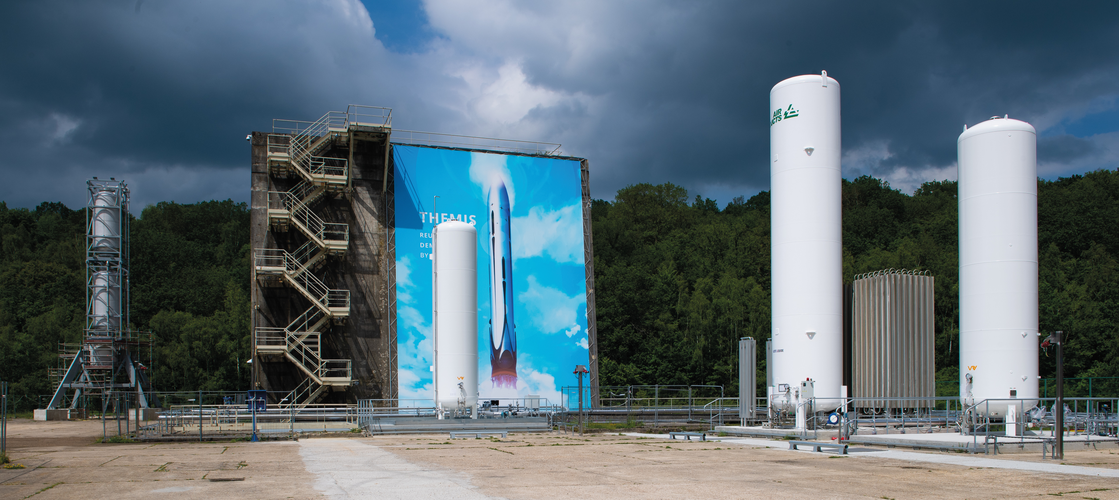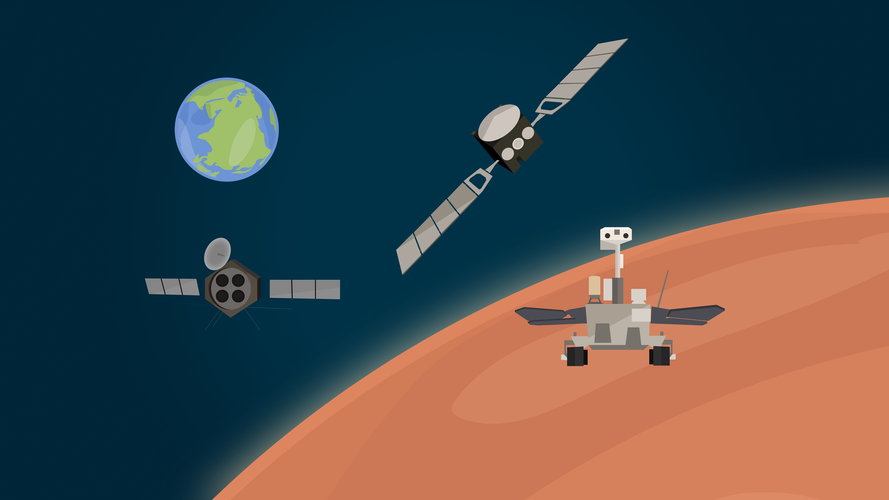
Copernical Team
SpaceX Starlink launch from Florida delayed to Thursday
 SpaceX's plan to launch 53 more Starlink spacecraft from Florida has been delayed a day to Thursday, as the company struggles with plans to develop a second generation of the communications satellites.
SpaceX gave no immediate reason for the postponement.
With the rescheduling, a Falcon 9 rocket is scheduled to carry the satellites into orbit at 6:28 p.m. EST from Complex 40 at C
SpaceX's plan to launch 53 more Starlink spacecraft from Florida has been delayed a day to Thursday, as the company struggles with plans to develop a second generation of the communications satellites.
SpaceX gave no immediate reason for the postponement.
With the rescheduling, a Falcon 9 rocket is scheduled to carry the satellites into orbit at 6:28 p.m. EST from Complex 40 at C Test tanks fuelled for ESA’s Themis reusable first stage

Recently completed tests of two propellant tanks set a first technological milestone in the ESA reusability roadmap towards the demonstration of a reusable first stage vehicle called Themis.
Soon, 1 out of every 15 points of light in the sky will be a satellite

I'm outside at my rural Saskatchewan farm, chatting with my neighbors who I've invited over to appreciate the night sky through my telescope. After exclamations and open-mouthed wonder over Saturn's rings, and light that has been traveling through space for more than two million years to reach our eyes from the Andromeda Galaxy, our conversation inevitably turns to the pandemic, our work-from-home arrangements and complaints about rural internet. My neighbor casually mentions they've just switched to using Starlink for their internet provider.
I glance up and notice a bright satellite moving across the sky, almost certainly a Starlink, since they now make up almost half of the nearly 4,000 operational satellites and they're extremely bright. I take a deep breath and carefully consider how to discuss the substantial cost that we're all going to have to pay for Starlink internet.
I don't blame my neighbors for switching.
Carrier rocket takes off from Sichuan province
 China launched a Long March 3B carrier rocket early on Saturday morning to send a communication satellite into space, according to China Aerospace Science and Technology Corp, the country's leading space contractor.
The State-owned company said the rocket blasted off at 12:40 am from the Xichang Satellite Launch Center in Sichuan province and later deployed the ChinaSat 1D satellite in its
China launched a Long March 3B carrier rocket early on Saturday morning to send a communication satellite into space, according to China Aerospace Science and Technology Corp, the country's leading space contractor.
The State-owned company said the rocket blasted off at 12:40 am from the Xichang Satellite Launch Center in Sichuan province and later deployed the ChinaSat 1D satellite in its Eagle professor's space debris removal device receives patent
 An Embry-Riddle Aeronautical University professor and his co-inventors patented a device that provides a workable strategy for combating the problem of debris accumulating in space from defunct satellites.
Known as the Drag De-Orbit Device, or D3, the invention can guide small satellites from low Earth orbit, maneuvering them through Earth's atmosphere, where they burn up. Destruction of t
An Embry-Riddle Aeronautical University professor and his co-inventors patented a device that provides a workable strategy for combating the problem of debris accumulating in space from defunct satellites.
Known as the Drag De-Orbit Device, or D3, the invention can guide small satellites from low Earth orbit, maneuvering them through Earth's atmosphere, where they burn up. Destruction of t Doing photon upconversion a solid-Crystals that convert light to more useful wavelengths
 Solid-solution organic crystals have been brought into the quest for superior photon upconversion materials, which transform presently wasted long-wavelength light into more useful shorter wavelength light. Scientists from Tokyo Institute of Technology revisited a materials approach previously deemed lackluster-using a molecule originally developed for organic LEDs-achieving outstanding performa
Solid-solution organic crystals have been brought into the quest for superior photon upconversion materials, which transform presently wasted long-wavelength light into more useful shorter wavelength light. Scientists from Tokyo Institute of Technology revisited a materials approach previously deemed lackluster-using a molecule originally developed for organic LEDs-achieving outstanding performa Study suggests Sun is likely an unaccounted source of the Earth's water
 Curtin University researchers have helped unravel the enduring mystery of the origins of the Earth's water, finding the Sun to be a surprising likely source.
A University of Glasgow-led international team of researchers including those from Curtin's Space Science and Technology Centre (SSTC) found the solar wind, comprised of charged particles from the Sun largely made of hydrogen ions, cr
Curtin University researchers have helped unravel the enduring mystery of the origins of the Earth's water, finding the Sun to be a surprising likely source.
A University of Glasgow-led international team of researchers including those from Curtin's Space Science and Technology Centre (SSTC) found the solar wind, comprised of charged particles from the Sun largely made of hydrogen ions, cr New possibilities for life at the bottom of Earth and other Oceanic Worlds
 In the strange, dark world of the ocean floor, underwater fissures, called hydrothermal vents, host complex communities of life. These vents belch scorching hot fluids into extremely cold seawater, creating the chemical forces necessary for the small organisms that inhabit this extreme environment to live.
In a newly published study, biogeoscientists Jeffrey Dick and Everett Shock have det
In the strange, dark world of the ocean floor, underwater fissures, called hydrothermal vents, host complex communities of life. These vents belch scorching hot fluids into extremely cold seawater, creating the chemical forces necessary for the small organisms that inhabit this extreme environment to live.
In a newly published study, biogeoscientists Jeffrey Dick and Everett Shock have det New study shows the largest comet ever observed was active at near-record distance
 A new study by University of Maryland astronomers shows that comet Bernardinelli-Bernstein (BB), the largest comet ever discovered, was active long before previously thought, meaning the ice within it is vaporizing and forming an envelope of dust and vapor known as a coma. Only one active comet has been observed farther from the sun, and it was much smaller than comet BB.
The finding will
A new study by University of Maryland astronomers shows that comet Bernardinelli-Bernstein (BB), the largest comet ever discovered, was active long before previously thought, meaning the ice within it is vaporizing and forming an envelope of dust and vapor known as a coma. Only one active comet has been observed farther from the sun, and it was much smaller than comet BB.
The finding will 

